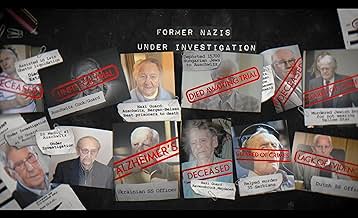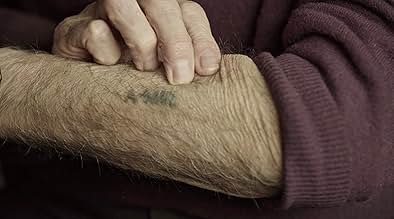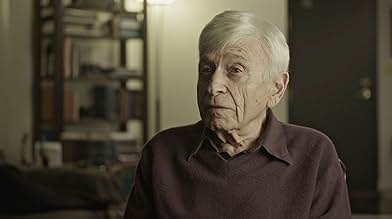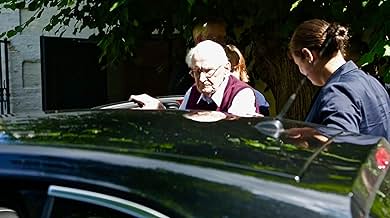NOTE IMDb
7,3/10
3,1 k
MA NOTE
Ajouter une intrigue dans votre langueSeventy years after WWII, Oskar Gröning, one of the last surviving members of the SS, goes on trial as an accessory to the murder of 300,000 people at the Auschwitz concentration camp.Seventy years after WWII, Oskar Gröning, one of the last surviving members of the SS, goes on trial as an accessory to the murder of 300,000 people at the Auschwitz concentration camp.Seventy years after WWII, Oskar Gröning, one of the last surviving members of the SS, goes on trial as an accessory to the murder of 300,000 people at the Auschwitz concentration camp.
- Récompenses
- 7 victoires et 5 nominations au total
Alan Dershowitz
- Self
- (as Alan M. Dershowitz)
Avis à la une
That accountant was guilty, justice is blind. Age is no excuse for crimes. The only question is how do you punish them in a fair way. But I stand firmly on the side of those that seek justice. There are a lot of complexities in bringing a trial about. But at the end of the day you need to punish the guilty, no matter how long it takes. Its the morally right thing to do. I don't want to sound draconian but if you are guilty of crimes against humanity then you are guilty.
In not to repeat the mistakes of history, we should learn about them. Oskar Groning was told in the 60s he would not be prosecuted. He openly and frankly discussed what happened at Auschwitz. He should not be prosecuted because he is doing more to prevent the repetition of history than his trial and conviction would ever achieve. Until he spoke, the world had only heard the story of the camp from one side. Thanks to Oskar, the history has been told.
If Oskar is to be prosecuted, then the member of the zondercommando, if alive, who admitted to killing a fellow prisoner who was German should be tried for murder.
If Oskar is to be prosecuted, then the member of the zondercommando, if alive, who admitted to killing a fellow prisoner who was German should be tried for murder.
10Elijah_T
For the record, I saw this immediately after Nazi VR (2017).
This was a very interesting documentary that went into court cases I never heard about and brought up an important question of who should be held responsible for atrocities. Hell, it'd make a great spark of classroom discussion and debate even.
One of the best things The Accountant of Auschwitz does is provide different sides of the argument. Who should be prosecuted (accountants, guards, executioners) and to what degree? Should anyone be forgiven? It doesn't really tell the audience how to feel. It just thoroughly informs and leaves the conversation entirely up to them.
There's an event that really caught me by surprise (the lady). I wasn't sure how to feel about it at first. While the act was understandable-ish, the prosecution should definitely continue. Now that I think about it, it reminds me of a documentary called Long Night's Journey Into Day (2000), which examines 4 out of 7000 cases that were brought before South Africa's Truth and Reconciliation Commission (TRC) since 1994 "to mediate between those seeking amnesty from apartheid-related crimes and the families of their victims." The TRC's restorative justice method is a stark contrast to the Nuremberg's Trials' retributive justice. I highly recommend watching both within the same week and asking yourself which is most appropriate for South Africa's apartheid and Germany's antisemitism.
This was a very interesting documentary that went into court cases I never heard about and brought up an important question of who should be held responsible for atrocities. Hell, it'd make a great spark of classroom discussion and debate even.
One of the best things The Accountant of Auschwitz does is provide different sides of the argument. Who should be prosecuted (accountants, guards, executioners) and to what degree? Should anyone be forgiven? It doesn't really tell the audience how to feel. It just thoroughly informs and leaves the conversation entirely up to them.
There's an event that really caught me by surprise (the lady). I wasn't sure how to feel about it at first. While the act was understandable-ish, the prosecution should definitely continue. Now that I think about it, it reminds me of a documentary called Long Night's Journey Into Day (2000), which examines 4 out of 7000 cases that were brought before South Africa's Truth and Reconciliation Commission (TRC) since 1994 "to mediate between those seeking amnesty from apartheid-related crimes and the families of their victims." The TRC's restorative justice method is a stark contrast to the Nuremberg's Trials' retributive justice. I highly recommend watching both within the same week and asking yourself which is most appropriate for South Africa's apartheid and Germany's antisemitism.
Overall entertaining but after the end you have the feel like the documentary is overly biased
To have access to the trove of information, including much in the public domain from interviews and the trial of the 'Accountant' is a documentary film makers dream. But in this work, it is spoiled by scant regard for basic journalism and documentary makers 'Rule #1 - trust but verify' sources statements. That the subject was not even spoken to in the making of the film, nor statements included being second-source validated, was a real distortion, leaving the otherwise exceptionally interesting subject an Emperor with no clothes
Meilleurs choix
Connectez-vous pour évaluer et suivre la liste de favoris afin de recevoir des recommandations personnalisées
- How long is The Accountant of Auschwitz?Alimenté par Alexa
Détails
- Date de sortie
- Pays d’origine
- Site officiel
- Langues
- Aussi connu sous le nom de
- The Accountant of Auschwitz
- Lieux de tournage
- Israël(location)
- Sociétés de production
- Voir plus de crédits d'entreprise sur IMDbPro
Box-office
- Budget
- 600 000 $CA (estimé)
- Durée
- 1h 20min(80 min)
- Couleur
- Rapport de forme
- 16 : 9
Contribuer à cette page
Suggérer une modification ou ajouter du contenu manquant





































